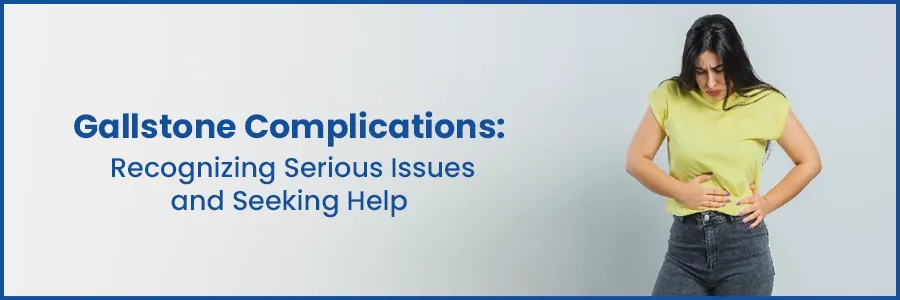
Gallstone Complications
Understanding Gallstone Complications
- Introduce the topic of gallstone complications and their significance.
- Highlight the importance of recognizing signs of serious issues and seeking timely medical attention.
Common Gallstone Complications
Gallstone Obstruction
- Explain how gallstones can block the bile duct, causing pain and discomfort.
- Describe the symptoms of gallstone obstruction, including intense pain, nausea, and vomiting.
Cholecystitis
- Define cholecystitis as inflammation of the gallbladder often caused by gallstones.
- Discuss symptoms like severe abdominal pain, fever, and tenderness.
Choledocholithiasis
- Detail choledocholithiasis, where gallstones obstruct the common bile duct.
- Describe the symptoms of jaundice, dark urine, and pale stools associated with this condition.
Recognizing Signs of Serious Complications
Unrelenting Pain
- Emphasize that persistent and severe pain requires medical attention.
- Mention the location and characteristics of gallstone-related pain.
Fever and Infection
- Explain how fever can indicate a complication like cholecystitis or an infection.
- Discuss the importance of not ignoring fever alongside other symptoms.
Jaundice
- Detail jaundice as a sign of bile duct obstruction due to gallstones.
- Highlight the yellowing of the skin and eyes as a key symptom.
Changes in Stool and Urine
- Explain how pale stools and dark urine can indicate gallstone-related issues.
- Emphasize that such changes warrant medical evaluation.
Secure your health with a second opinion. Make informed decisions and book your appointment today!
Get A Second OpinionSeeking Medical Help
When to Consult a Doctor
- Provide clear guidelines on when to seek medical attention for gallstone-related complications.
- Encourage readers not to delay seeking help if they experience severe symptoms.
Diagnostic Tests
- Discuss common diagnostic tests, such as ultrasound and CT scans, used to identify complications.
- Explain how these tests help doctors assess the severity of the situation.
Treatment Options
- Briefly mention treatment options based on the diagnosed complication.
- Indicate that treatments may include medication, surgical intervention, or minimally invasive procedures.
Preventive Measures
- Stress the importance of adopting a healthy lifestyle to prevent gallstone complications.
- Provide tips for maintaining a balanced diet and managing weight.
Prioritizing Your Health
- Summarize the key takeaways from the blog.
- Encourage readers to be vigilant about recognizing serious gallstone complications and seeking prompt medical help.
Conclusion:
Remember to provide accurate information and practical advice, but also emphasize the importance of individualized medical guidance. Gallstone complications can vary in severity, so it's crucial to consult a healthcare professional for proper evaluation and treatment.
Ready to take control of your health journey? Book your appointment now and start your path towards wellness today!
Book an AppointmentFrequently Asked Questions
Gallstone complications are health issues that arise when gallstones cause blockages, inflammation, or other disruptions in the Gallbladder or bile ducts.
Gallstones can block the bile duct, preventing the flow of bile and causing intense pain and discomfort.
Cholecystitis is gallbladder inflammation often triggered by gallstones. Symptoms include severe pain and fever.
Yes, gallstones can obstruct the bile duct, leading to the buildup of bilirubin and causing jaundice (yellowing of the skin and eyes).
Symptoms include severe and unrelenting pain, fever, jaundice, dark urine, and pale stools.
Fever can indicate infection or inflammation due to complications, especially if accompanied by other symptoms.
Gallstone pain typically occurs in the upper right abdomen and may radiate to the back or shoulder. It's often intense and persistent.
Yes, especially if the pain is severe, persistent, or accompanied by other symptoms.
Yes, ultrasound, CT scans, and MRCP (Magnetic Resonance Cholangiopancreatography) are commonly used to diagnose gallstone-related complications.
Treatment depends on the specific complication but may include pain management, antibiotics, surgery, or minimally invasive procedures.
Adopting a healthy lifestyle, maintaining a balanced diet, managing weight, and staying hydrated can help reduce the risk of gallstone-related issues.
In some cases, medication and lifestyle changes can help manage symptoms, but complications often require medical intervention.
Gallstone complications can occur but are not as common as the presence of gallstones themselves.
Yes, severe complications like gallstone-induced pancreatitis or infection can be life-threatening if not treated promptly.
Depending on the severity of the complications, surgical removal of the gallbladder (cholecystectomy) may be recommended for long-term relief.
